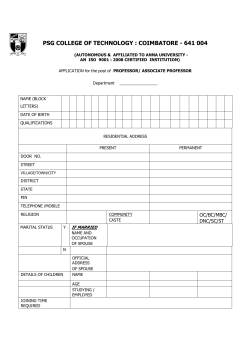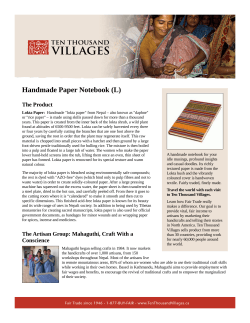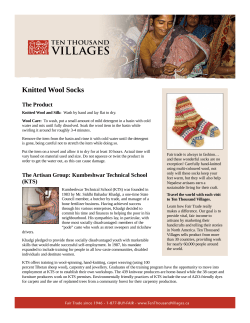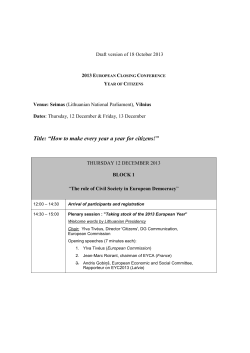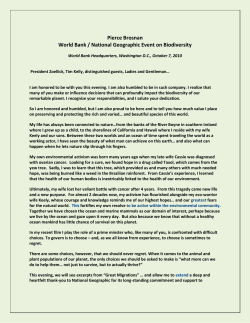
How to Note Relevant Contribution in Fragile Contexts Corporate Domain Regional Cooperation
Federal Department of Foreign Affairs FDFA Swiss Agency for Development and Cooperation SDC Corporate Domain Regional Cooperation Conflict & Human Rights / South Asia Division How to Note Relevant Contribution in Fragile Contexts Date: August 2013 For: CHR Net Members for discussion Copy to: Task Force Fragility 1. WHY – Parliamentary Dispatch 2013-16 SDC is making a relevant contribution to the improvement of the living conditions, the reduction of causes of conflicts and the increase of the crisis resistance in selected fragile contexts, in order to help concerned states to more effectively overcome internal and external crises. The SDC directorate approved on 08 July 2013 that observation fields for measuring this impact will orientate themselves on international requirements of OECD DAC / INCAF regarding the peace- and statebuilding goals. 2. WHO – SCOs Concerned are all SCOs in fragile contexts. According to OECD DAC „State fragility is defined as a lack of capacity to perform basic state functions, where “capacity” encompasses (a) organizational, institutional and financial capacity to carry out basic functions of governing a population and territory (b) the state’s ability to develop mutually constructive and reinforcing relations with society.” SCOs shall identify with a context analysis how they are able to contribute with their management results and domain outcomes reduction of causes of conflicts, to increase crisis resistance of the state and improve the human rights situation. A non-exhaustive indication gives the Parliamentary Dispatch 2013-16: Great Lakes, Horn of Africa, Zimbabwe, Niger, Chad, Palestine / North Africa, Hindukusch, Myanmar, Nepal and Haiti. Countries of the Swiss cooperation with Eastern Europe report under Impact Objective 8 within the framework of the progress made in the transition process. (see below a current chart of countries and possible matching fields of observation) 3. When – Frequency Statements on the impact of SCOs programs and interventions on conflict causes, state resilience and enjoyment of human rights will be made in the Annual Report. There is no extra monitoring system. 4. How Statements on impact and change are possible against three fields of observation: reduction of conflict causes, state capacities to withstand crisis and human rights. Specific sub-fields of observation are linked in principle to the hypothesis of change of SCOs in fragile contexts, formulated within the cooperation strategy and addressed in the result framework. The following strategic statements of the cooperation strategy create the foundations: context analysis (chapter 1), impact statement (chapter 4) and allocation of results per intervention / domain as well as management- and performance results (chapter 5). That “change agenda” shall be mirrored within the Result Framework on management as well as domain level. 5. Orientation for fields of observation A selection of international reference indicators of the peace and state building goals (PSG) provide a useful guidance for each observation field. Causes of conflicts: participation of vulnerable and / or marginalized groups (e.g. social, ethic, gender, age etc.) in social, economic and political activities; PSG 1 Inclusive Policies (Non-discriminatory; trust in state institutions is provided by accountability of government officials and elites (independence of media, division of public and private / no politically established private monopolies for public goods); PSG 1 Inclusive Policies; increase of social inclusive employment and other income generation opportunities as means for sustaining livelihoods; PSG 4 Economic Foundations; increased state functions, covered by governmental ability to raise, priorities and manage own financial resources; PSG 5 Revenue and Services; Crisis resistance: increased perception that rule of law and state monopoly on security and force not compromised and formal justice mechanism are accessible, affordable and received as fair and informal means of dispute resolution applying international human rights standards; PSG 3 Justice; increased perception of security forces as effective and accountable with a special focus on vulnerable and marginalized groups (absence of violence as means for conflict resolution); PSG 2 Security; implemented measures according to Res. 1325 (key components and national plan); PSG 1 Inclusive Policies; production, exports, redistribution and recycling of small arms and light weapons (decreasing trend); PSG 2 Security. Human Rights: accepted, ratified and implemented international human rights treaties (ICCPR, ICESCR, ICERD, CEDAW, CAT, CRC, Geneva Conventions and Protocols, including individual complaint mechanism) into national laws and policies (principles of equality and nondiscrimination as well as universality and indivisibility are respected); cooperative participation in established international procedures (including among others treaty bodies, UN Charta based protection mechanism such as field visits and UPR, visits by ICRC); increased perception of governmental responses to recommendations by international procedures in national policies as adequate, relevant, non-discriminatory and participatory; increased use of non-discriminatory use of national mechanisms for redress and remedy for human rights violations, including accountability mechanisms for human rights duty bearers (rule of law); Annex: proposed fields of observation per country fields of oberservation for impact statement Conflict causes State capacety to withstand conflict and crisis Human Rights Latin America and Caribeian Latin America and Caribeian Latin America and Caribeian Haiti tbd (Haiti) Honduras Ostasien Ostasien Ostasien Myanmar tbd Kambodscha Ost- und Südliches Afrika Ost- und Südliches Afrika Ost- und Südliches Afrika Grand Lacs (Burundi) HoA (Somalia) Grand Lacs (tbd) HoA (tbc Somalia) Südasien Südasien Afghanistan Nepal Westafrika Mali Niger EMM / OpT tbd Afghanistan Pakistan Nepal Westafrika Mali EMM / OpT Tbd Mali tbc Benin tbc Tchad tbc Zimbabwe Südasien Afghanistan Bangladesh Pakistan Nepal Westafrika Mali EMM / OpT tbd
© Copyright 2025






